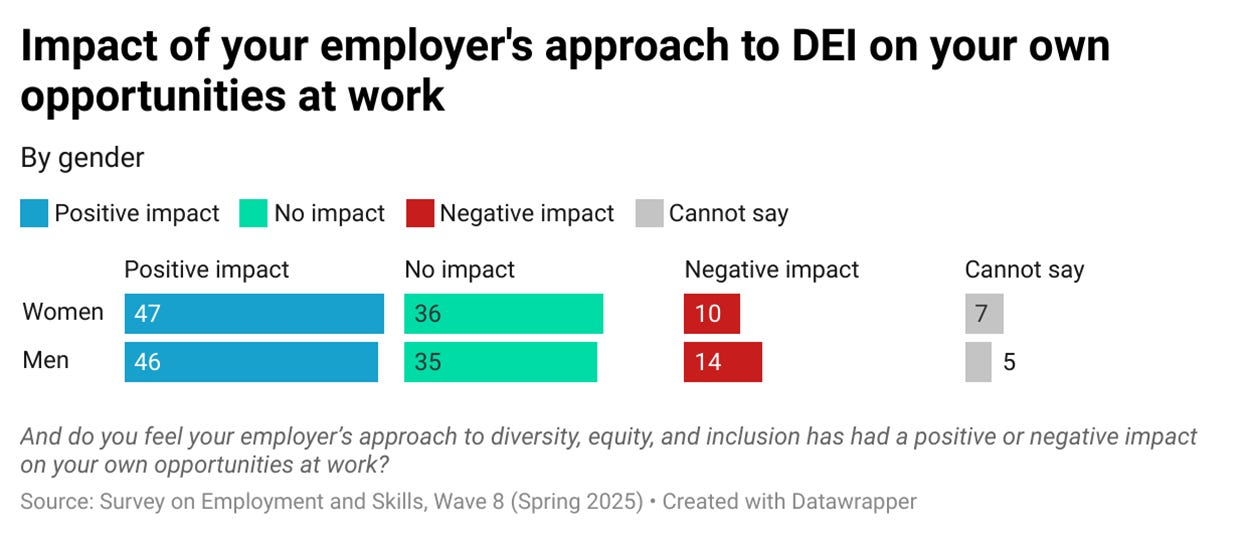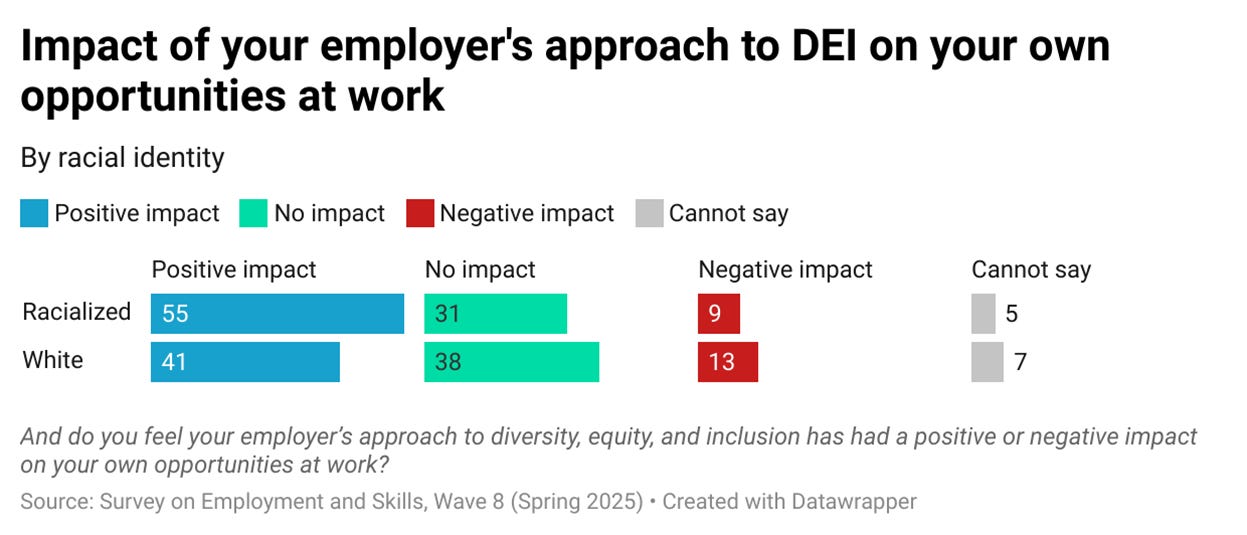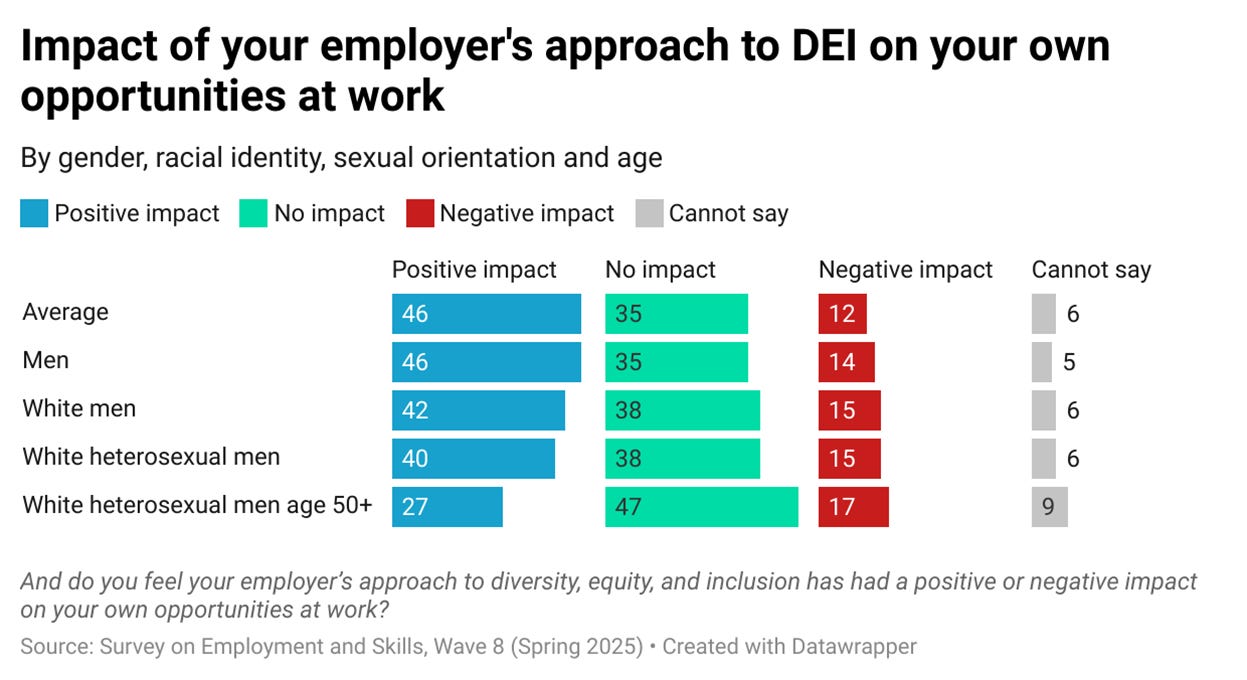Spot the backlash
What employees really think of policies to promote diversity, equity and inclusion at work
Policies designed to promote greater diversity, equity and inclusion (DEI) in the workplace currently face criticism from politicians and in the media – most notably in the United States, but also here in Canada.
In this context, it’s worth noting that these “DEI” policies are not really that controversial among employees themselves.
The Survey on Employment and Skills recently asked employed Canadians three questions about DEI policies, described as “efforts by some employers to hire employees of different racial and ethnic backgrounds, genders, age groups, or sexual orientations, and to promote equity in the workplace.”1 The survey finds that:
54% say that focusing on increasing diversity, equity and inclusion at work is mainly a good thing, while 27% say it was neither good nor bad and only 16% say it’s a bad thing;
46% say their company or organization pays about the right amount of attention to increasing diversity, equity and inclusion, while 22% say it pays too little attention and 26% say it pays too much attention; and
46% say their employer’s approach to diversity, equity and inclusion has had a positive impact on their own opportunities at work, 35% say it’s had no impact and only 12 percent say it’s had a negative impact.
In short, most workers are either supportive or neutral, and relatively few are critical.
Where it gets really interesting, though, is when we focus on the criticism. If only 12 percent of employed Canadians overall think they’ve been held back by their employer’s approach to DEI, surely this proportion is higher among certain – shall we say privileged? – groups.
Let’s take a closer look. Here’s a comparison of responses between men and women, followed by a comparison between those who identify as racialized and as white.
Neither men nor white employed Canadians seem particularly move aggrieved by DEI policies than, respectively, women or their racialized counterparts. I don’t think the four percentage-point difference (in the proportions reporting a negative impact in each case) really counts as a backlash.
But maybe we’re not looking closely enough. Thanks to the support of our survey partners at the Diversity Institute and the Future Skills Centre, the survey sample allows us to narrow the focus. Follow along in the chart below, which starts with the responses for employed adults in general, but then zeroes in on gender, racial identity, sexual orientation and age.2
Can you see the backlash taking shape? No, me neither.
Certainly, opinions are influenced by age. Older people are less likely to say that they’ve been positively affected by DEI policies (this holds true for older people in general, not just older white men). But opinions mostly shift to the neutral position (no impact). The proportion of white, heterosexual men age 50 and older who say their own opportunities have suffered as a result of DEI is only five percentage points higher than the average.
A more complete presentation and discussion of these survey results has been published in this report, available the website of the Diversity Institute:
Equity, Diversity and Inclusion Backlash? What Canadian Workers Really Think
There is surely much to debate in terms of how both employers and employees are responding to the growing diversity of Canada’s workforce. Policies designed with the best of intentions are not always well-implemented. Statements of principle are not always followed through in practice. We all have a lot to learn.3
That said, the survey data suggest that, on the whole, there is little sign of a growing groundswell of discomfort among Canadians about the steps that employers are taking to promote diversity, equity and inclusion at work.
The data in this post are from the eighth wave of the Survey on Employment and Skills. The author is solely responsible for any errors of presentation or interpretation.
This survey is conducted by the Environics Institute for Survey Research, in partnership with the Diversity Institute at Toronto Metropolitan University and the Future Skills Centre. The 8th wave of the study consists of a survey of 5,603 adult Canadians, conducted online (in the provinces) and by telephone (in the territories) between March 12 and April 15, 2025. More information about the survey is available on the Environics Institute website.
The Survey on Employment and Skills is funded primarily by the Government of Canada’s Future Skills Centre / Le sondage sur l’emploi et les compétences est financé principalement par le Centre des Compétences futures du gouvernement du Canada.
What is the Environics Institute for Survey Research? Find out by clicking here.
Follow us on other platforms:
Bluesky: @parkinac.bsky.social
Twitter: @Environics_Inst or @parkinac
Instagram and Threads: environics.institute
Cover photo credit: Andrea Piacquadio
The survey questions, including the description of DEI, were modelled on those developed by the Pew Research Center in the United States. See their 2024 report and questionnaire at https://www.pewresearch.org/short-reads/2024/11/19/views-of-dei-have-become-slightly-more-negative-among-us-workers/
The sample sizes for each group are: average = 3,538; men = 1,853; white men = 908; white heterosexual men = 807; white heterosexual men age 50+ = 192.
It’s also important not to dismiss the voices of those with negative opinions about the impact of DEI on their workplace or their own opportunities, simply because they are in the minority. This is not my intention. It’s valid to point out that Canadians from all backgrounds are more likely to view these policies positively rather than negatively. But this doesn’t mean that we shouldn’t be curious to learn more about the experiences of those who find themselves dissenting.






I am pretty sure that somewhere in the survey intro I promised to protect your anonymity.
In all seriousness, one of the main purposes of survey research is to help contextualize the voices we hear in the public sphere (media, politics).
There must be a backlash and you're just not measuring it properly. The National Post told me so. Have you tried breaking it down further? Maybe look at 60-year old dudes named Matt? I'm sure you can find a backlash if you look hard enough.